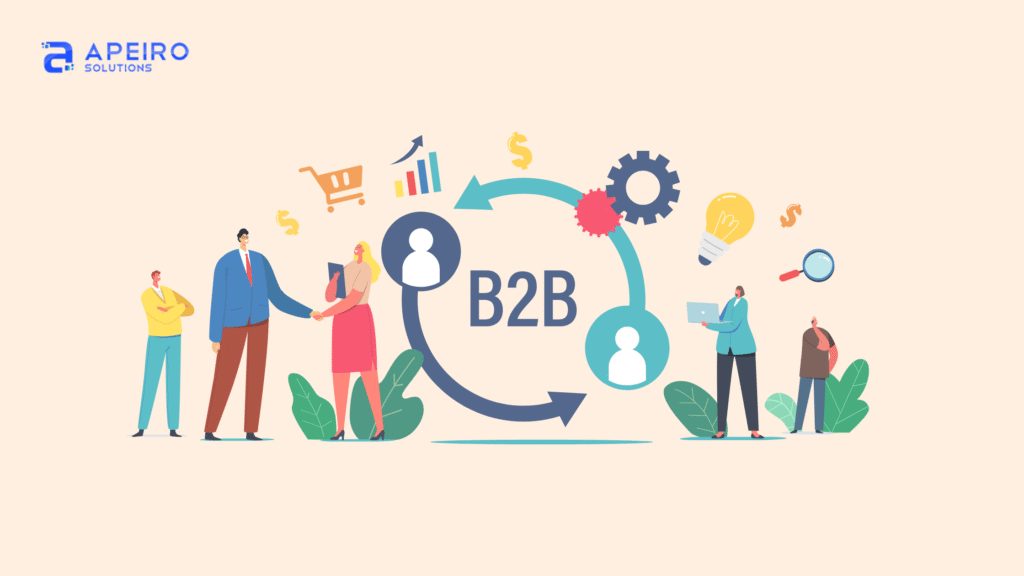
B2B sales automation tools are transforming how companies handle their sales and marketing operations. At Apeiro Solutions, we understand that B2B sales is a complex, lengthy, and detail-oriented process that often involves multiple stakeholders, extensive paperwork, and time-consuming follow-ups. Automation tools, powered by AI and analytics, are changing this landscape by helping businesses streamline workflows, reduce human error, and close deals faster.
Understanding B2B Sales Automation Tools
B2B sales automation involves using technology to reduce manual tasks and improve sales efficiency. Instead of spending hours updating spreadsheets or manually following up with prospects, sales teams can use automation platforms to manage repetitive actions such as lead qualification, email follow-ups, and reporting.
These tools are designed to manage every stage of the sales process from prospecting to closing. They integrate with CRMs (Customer Relationship Management systems) and other sales platforms, enabling data synchronization, real-time analytics, and automated workflows that keep teams productive and organized.
Automation also ensures that teams don’t lose valuable leads due to missed follow-ups or delays in outreach. By setting up triggers and workflows, sales teams can automate reminders, email sequences, and even personalized outreach helping them focus more on building relationships rather than administrative tasks.
Key Benefits of B2B Sales Automation Tools
1. Save Time and Increase Productivity
Manual data entry, lead scoring, and scheduling consume hours that could be better spent closing deals. Automation tools streamline these processes, freeing up your team to focus on strategy and conversions.
2. Reduce Errors and Improve Accuracy
Human errors in data entry or follow-up can lead to missed opportunities. Automated systems minimize these risks by standardizing workflows and maintaining consistent, accurate data across all platforms.
3. Shorten Sales Cycles
With automated communication, reminders, and analytics, the sales process moves faster. Prospects are nurtured efficiently, deals close quicker, and revenue is realized sooner.
4. Scale Your Operations
As your business grows, automation tools help you handle larger lead volumes without compromising quality. They enable you to run large-scale campaigns, manage thousands of leads, and track performance in real time.
5. Gain Actionable Insights
Modern automation platforms include powerful analytics features that track lead behavior, campaign performance, and sales efficiency. These insights help managers make data-driven decisions and forecast growth more accurately.
6. Deliver a Better Customer Experience
Automation ensures faster responses and consistent communication, improving the overall customer journey. When prospects receive timely and personalized messages, they are more likely to trust and engage with your brand.
Difference Between B2B and B2C Automation
While both B2B and B2C automation aim to enhance efficiency, their goals and processes differ.
- B2B automation focuses on lead management, CRM integration, and nurturing prospects across long sales cycles. It’s about relationship building, data enrichment, and precision targeting.
- B2C automation, on the other hand, focuses on direct engagement with end consumers, like sending abandoned cart reminders or promotional offers.
For B2B companies, automation tools are vital to managing multiple stakeholders and complex deal stages, ensuring nothing falls through the cracks.
Key Use Cases of Sales Automation
Email Personalization
Automation tools can draft and send personalized emails at scale, ensuring that every prospect feels valued. They use data insights to customize subject lines, offers, and messages, improving engagement rates.
Social Media Management
AI-powered tools can create, schedule, and track posts across platforms. They monitor engagement metrics, identify high-intent leads, and ensure your business maintains a consistent social presence.
Ad Campaign Optimization
Automation tools analyze campaign data and adjust ad placements, budgets, and targeting automatically. This ensures maximum ROI from every marketing dollar spent.
Reporting and Analytics
Manual reporting is time-consuming and prone to oversight. Automation software collects and analyzes performance data to generate easy-to-read dashboards, helping teams make quick, informed decisions.
Popular B2B Sales Automation Tools
Some widely used automation platforms include:
- Highperformr – An AI-native tool for lead enrichment, social media management, and sales outreach.
- HubSpot Sales – A CRM and automation suite that helps teams manage leads, emails, and meetings.
- ZoomInfo – For data enrichment, lead tracking, and account intelligence.
- Apollo – For automating research, outreach, and personalized engagement.
- Pipedrive – A CRM platform with automated workflows and sales insights.
- Each of these tools offers unique features suited for different aspects of the sales process, from lead generation to deal closure.
Best Practices for Implementing Automation
- Set Clear Objectives – Identify what you want to automate—emails, lead management, or analytics—and define measurable outcomes.
- Train Your Team – Ensure everyone understands how to use the tools effectively to maximize ROI.
- Review and Optimize Regularly – Monitor automated workflows and make improvements based on performance data.
- Avoid Over-Automation – Automation should support your team, not replace human interaction. Maintain a balance between personalization and efficiency.
Conclusion
Automation is no longer optional it’s essential for sustainable growth in B2B sales. With the right B2B sales automation tools, businesses can accelerate deal cycles, reduce manual work, and enhance productivity across teams.
At Apeiro Solutions, we help organizations integrate advanced automation tools that simplify complex sales workflows, deliver actionable insights, and drive measurable results. If you’re ready to streamline your sales process and boost performance, it’s time to make automation part of your strategy.
